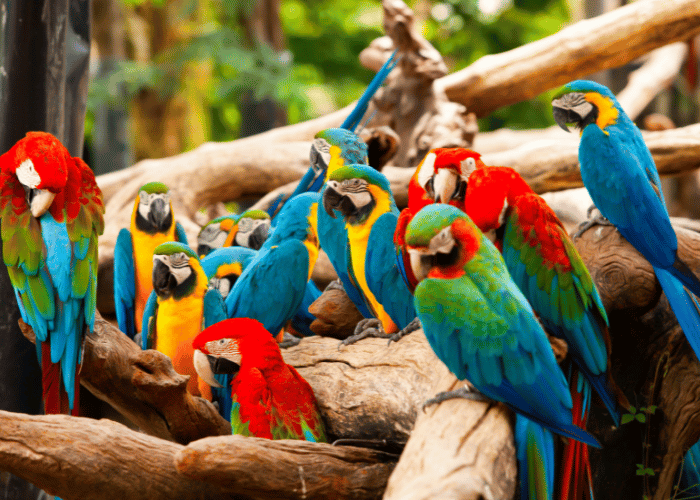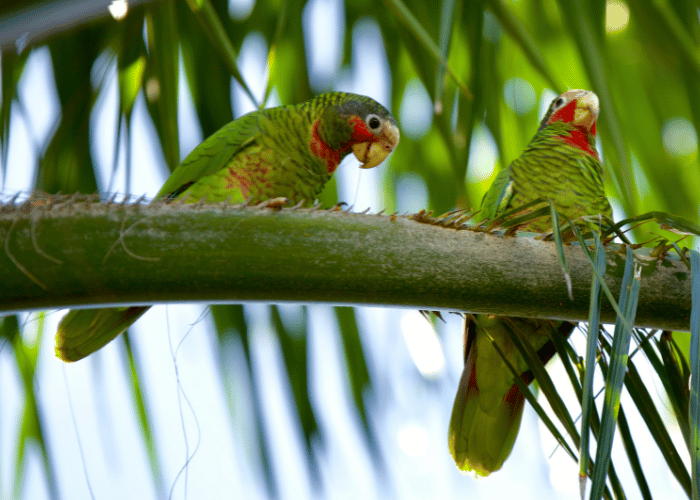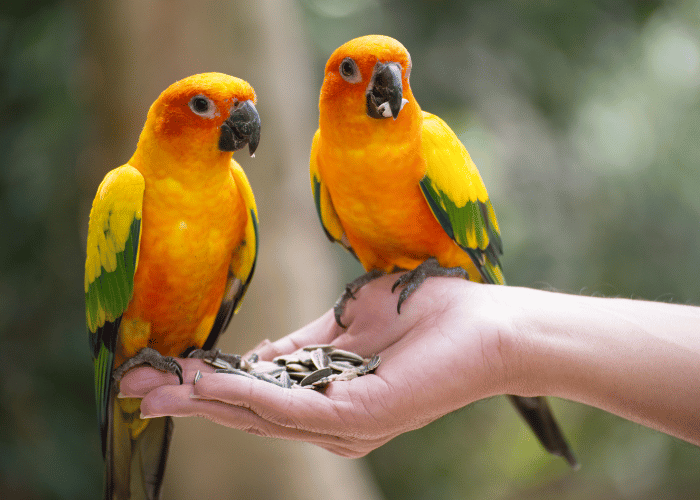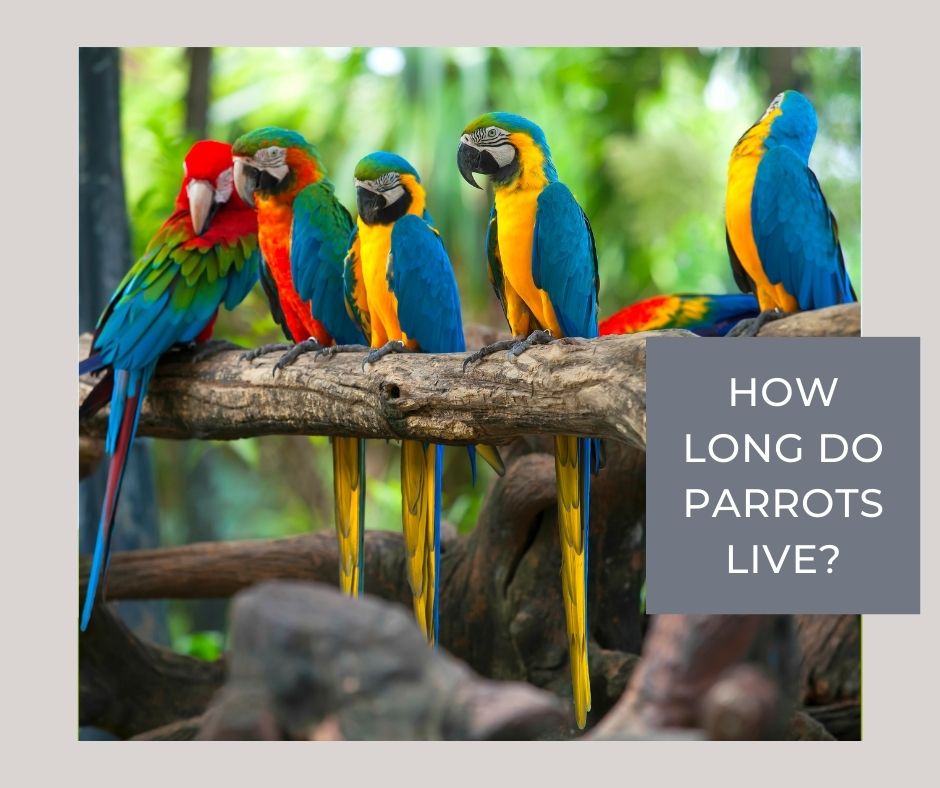How Long Do Parrots Live
Table of Contents
There’s something endlessly fascinating about parrots, isn’t there? These brilliantly colored members of the bird kingdom are known for their intelligence, social behavior, and vibrantly colored feathers. But how long do parrots live?
Well, buckle up, because you’re in for a surprise. Some parrot species can live a pretty impressive lifespan. The average lifespan of a parrot is anywhere from 20 to 80 years depending on the species, making them some of the longest-living pets you could choose to share your home with. That’s a big commitment, isn’t it?
Of course, a multitude of factors can impact the individual lifespan of any particular parrot. These factors can include everything from diet and environment to medical care and mental stimulation. But knowing the potential lifespan of your winged friend is a great first step in understanding what owning one of these beautiful creatures could entail. Now, let’s delve deeper into the captivating world of parrots!

Understanding the Parrot Lifespan
Are you curious about the lifespan of your feathery friend? It’s a common topic in the parrot-owning world. The truth is, the life expectancy of parrots varies significantly depending on the species. So, let’s dive into this parroty puzzle!
Parrots, as a group, are some of the longest-living bird species around. In fact, large parrot species like the macaw or the cockatoo can expect to live anywhere from 35 to 80 years – often outliving their human companions! Meanwhile, their smaller siblings, like the lovebirds or parakeets, can hope to reach a modest 15 years.
Here’s a quick breakdown of the average lifespan for some common parrot species:
| Parrot Species | Average Lifespan |
|---|---|
| Macaw | 60 – 80 years |
| Cockatoo | 40 – 70 years |
| Lovebird | 10 – 15 years |
| Parakeet | 12 – 14 years |
Of course, these numbers are not set in stone. The lifespan of any parrot depends on a variety of factors, including:
- Diet: A balanced diet of seeds, fruits, vegetables, and protein can extend a parrot’s life expectancy.
- Exercise: Regular mental and physical stimulation is key to keeping your bird healthy.
- Healthcare: Access to quality veterinary care is important for catching and treating any potential health issues early.
You might be surprised to know that many parrots in the wild don’t reach these old ages. Captivity can sometimes be a blessing for these colorful creatures, as it removes many natural risks and threats.
Just remember, with a longer lifespan comes great responsibility. Owning a parrot is a long-term commitment, often akin to caring for a perpetual toddler with feathers! But given the right care and attention, your parrot can become a lifelong companion, providing colorful conversation and companionship for years to come.
Embrace the challenge and treasure the experience. After all, life’s a big bird journey, and you’re along for the colorful— and markedly long— flight!
Factors Influencing a Parrot’s Life Expectancy
When it comes to understanding how long parrots live, you’ll come across a fascinating range of factors, just as complex and diverse as the parrots themselves. Let’s delve into this exciting world!
Species is a game changer. You see, an African Grey or a Macaw may outlive a Lovebird by a good couple of decades. In fact, here’s a little snippet of the varying life expectancies:
| Species | Average Lifespan |
|---|---|
| African Grey | 40-60 Years |
| Macaw | 30-50 Years |
| Lovebird | 10-15 Years |
But guess what? It’s not all about the species! Oh, no, there’s more to the story. What if I told you diet also plays an integral part? Imagine being confined to a diet of chips and soda. Sounds terrible, doesn’t it? Well, the same applies to your feathery friend. Keeping their diet varied with fruits, vegetables, and high-quality pellets can make a considerable difference.
Don’t forget about habitats. This involves the quality and size of the cage, the ambient temperature, even the altitude. This environment is where they sleep, eat, chirp, and pretty much live their whole life. Size matters here. They need room to sprawl and move freely. Keeping the cage clean is a no-brainer, but it’s also crucial to ensure the area is quiet and the temperature is just right. Not too chilly, not too hot. Goldilocks would be proud!
Exercise and social interaction are paramount. Much like you and me, parrots need their daily dose of physical exercise and social time. Without these, they can become overweight, depressed, or even develop behavioral issues. A little fun goes a long way!
Preventive healthcare wraps it up. Regular vet check-ups detect health problems early on, so they don’t escalate. The saying holds – better safe than sorry!
In essence, providing the right care will put your parrot on a good heading for a long, healthy life. Now you’re better informed, your parrot could be a lifelong companion! Happy bird parenting!
Lifespan Differences Between Parrot Species
Now let’s dive straight into the lifespan differences between parrot species. Yes, not all parrots have the same lifespans. Much like humans, their lifetimes can also be impacted by their environment, diet, and overall care.
But before we delve deeper, remember that a parrot isn’t just a parrot. There’s a spectacular subset of species each with their own unique traits and lifespan.
Let’s check out some popular parrot species and their average lifespans:
| Parrot Species | Average Lifespan |
|---|---|
| African Grey Parrot | 40 – 60 years |
| Budgerigar | 5 – 10 years |
| Cockatiel | 10 – 14 years |
| Macaw | 30 – 60 years |
African Grey Parrots are known for their longevity, often living up to 60 years if properly cared for. On the other hand, your Budgerigars have a much shorter lifespan, typically kicking around for 5 to 10 years.
You’ll notice the lifespan swings as we move across species. For instance, the Macaw sits on a wider bracket, living between 30 and 60 years. This vast range signifies the considerable differences in lifespan even within a single species!
Here’s an interesting tidbit – environment plays a key role in how long your feathery friend lives. Parrots in the wild tend to live longer due to their natural diet and more physical activity. That’s why it’s IMPORTANT to provide an optimal environment if you’re caring for a parrot at home.
Living conditions, diet, and general care can significantly impact the lifespan of your parrot. Just like us, they need a balanced diet, regular exercise, social interaction, and mental stimulation to thrive.
Keep in mind, these are average lifespans. And “average” means there will always be exceptions. Your parrot could far outlive the numbers mentioned above; with right care, love and attention, they just might surprise you!
So, why don’t you grab this chance to be the best parrot-parent you can be? Give them a life full of joy and let them surprise you with how long they stick around. After all, age is just a number, right? Especially when it comes to our feathered friends.

How to Improve Your Parrot’s Longevity
Hold onto your feathers folks, because we’re about to dive into the world of parrot longevity. If you’re a proud parrot parent, you’re probably wondered how you can help your feathered friend live a long and healthy life. Well, you’ve come to the right place.
First thing’s first, diet plays a big role in your parrot’s health. You might not know it, but parrots need a lot of fresh fruits and veggies in their diet. It’s not just about seeds anymore. Their diet should look something like this:
- 60% Pelleted Diet
- 30% Fresh Fruits & Veggies
- 10% Seeds and Nuts
These numbers aren’t set in stone, of course, because every bird is unique.
Just like us humans, parrots need exercise too. They can’t just sit around in a cage all day, they need to stretch their wings. Block out an hour or two every day for some out-of-cage time, and your parrot will thank you.
Think of the environment where your parrot is spending its time. Is it safe? Is it clean? All these things contribute to a bird’s health. Make sure there’s no open windows (your little flyer might escape), no toxic plants, no open flames, and that their cage is always clean and spacious.
Last but not least, regular vet visits are a must. Parrots have an uncanny ability to hide illness, so regular check-ups are paramount. Pick a vet that specializes in birds, or avian medicine.
Hey, longevity isn’t rocket science. With just a little bit of effort, you can keep your parrot perky and chirpy for years on end. Remember, a healthy parrot is a happy parrot!
Common Health Issues in Older Parrots
Older parrots, like any aging pets, can encounter a slew of health challenges. Your feathered friend could suffer from arthritis, respiratory issues, and obesity, among other things. Let’s explore these deceases in more detail.
Arthritis is a common problem in aging parrots. They start to feel pain and stiffness in their joints which may affect their ability to move and play. Symptoms might include changes in posture, reluctance to move, or abnormal beak or feather wear. It’s essential to provide extra support, like modified perches and easy-to-reach food and water dishes, if arthritis is suspected.
As parrots grow older, they may also face respiratory issues. Do you often hear your parrot wheezing? Or notice an increase in their breathing rate when they are resting? These could be signs of respiratory disease. Avoid smoking or using aerosols around your parrot and keep their environment dust-free to help them breathe easier.
Obesity too is not uncommon in older parrots, especially with a diet high in fat and low in vegetables. Obese parrots may display decreased activity, difficulty in flight, or fatty growths and are prone to liver disease.
But here’s the good news – most of these health issues can be managed or even reversed with expert help and proper care.
Don’t ignore even the smallest changes, as they may signal bigger health complications. Regular vet checks are crucial for early detection and treatment. Keep an eye on your parrot, observe anything different or abnormal, and not hesitate to consult with a vet.
Here’s a quick recap of the common health issues in older parrots:
| Health Issue | Symptoms | Tips |
|---|---|---|
| Arthritis | Pain, posture change, reluctance to move | Modify perches, easy access food and water |
| Respiratory Issues | Wheezing, increased breathing rate | Avoid smoke or aerosols, keep environment dust-free |
| Obesity | Decreased activity, difficulty in flight, fatty growths | Monitor diet, consult a vet |
Remember, it’s all about observing and acting fast. After all, you want your feathered companion to live a happy, healthy life, right?

Wrapping Up: Caring for Aging Parrots
Hey there, pet lovers! We’ve reached the end of our feathery journey, exploring the ins and outs of how long parrots live. But before we fly off, let’s discuss a vital topic – taking care of our ageing parrot pals. Their golden years can be just as vibrant as their youthful ones if you know how to effectively care for them, let’s delve into it.
Taking care of ageing parrots requires patience, understanding, and loads of love. Just like with humans, age brings conditions that might require special care and attention. Occasional visits to the vet become more frequent and necessary as your bird gets older. Don’t view it as a burden, but an opportunity to extend your lovely pet’s life as much as you can.
Did you know that nutritional needs also shift? Your parrot’s diet might need a few tweaks. Less fat, more fiber, and making sure your feathery friend gets their fill of vitamins A, D, and E becomes paramount. It’s all about striking the balance!
Here are some universal tips to keep your ageing parrot chirpy and healthy:
- Schedule regular vet check-ups.
- Tailor their diet according to their age.
- Provide a quiet and peaceful environment.
- Keep them mentally stimulated with toys and interaction.
- Maintain a strict sleep schedule.
Remember, our precious parrots are often long-lived companions, and it’s our duty to make their twilight years comfortable and joyous. Being sensitive to their ageing process and adapting to their needs will ensure they stay healthy, happy, and part of our lives for as long as possible. Thanks for joining us on this journey, until next time, keep those parrots chirping!






